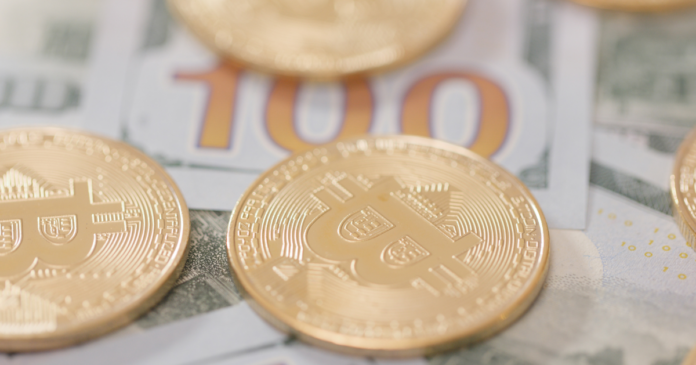In recent years, Bitcoin has emerged as a potential hedge against inflation. Challenging the traditional fiat currencies in this regard.
This article explores Bitcoin’s role in fighting inflation and draws a comparison between fiat currencies and Bitcoin.
Understanding Inflation with Traditional Solutions
Before delving into Bitcoin’s role in combating inflation, it’s crucial to grasp the concept of inflation and its implications. Inflation occurs when the supply of money in an economy outpaces the growth of goods and services. This excess money leads to rising prices, making it more expensive to purchase everyday items.
Over time, this erodes the purchasing power of a currency, meaning that the same amount of money can buy fewer goods and services.
💰 🧒 New video: #Inflation explained to kids
🧑🏫 Are you a teacher, or looking to make the complex topic of inflation easier for kids to understand❓ Eurostat just released a short animation on inflation, targeted at youngsters❗
➡️ https://t.co/ZojMvil8RX pic.twitter.com/0jHi4e5jZW
— EU_Eurostat (@EU_Eurostat) October 2, 2023
Governments and central banks employ several tools to combat inflation. These measures include adjusting interest rates, open market operations, and altering reserve requirements for banks. In some cases, governments may also implement fiscal policies such as increasing taxes or reducing government spending.
These methods aim to either increase the cost of borrowing, reduce the money supply, or stimulate economic growth to bring inflation under control.
Bitcoin’s Anti-Inflation Properties
Bitcoin, as a decentralized digital currency, offers unique properties that position it as a potential hedge against inflation. Here are some ways in which Bitcoin can fight inflation:
- Fixed Supply: One of the most critical aspects of Bitcoin is its fixed supply. There will only ever be 21 million Bitcoins in existence, making it inherently deflationary. This is in stark contrast to fiat currencies, which can be printed in unlimited quantities by governments. The limited supply of Bitcoin helps protect against the devaluation of currency due to inflation.
- Transparency and Predictability: Bitcoin operates on a transparent and predictable monetary policy. The rate at which new Bitcoins are created is halved approximately every four years in a process known as “halving.” This predictable issuance schedule provides clarity to investors and prevents sudden, unexpected increases in the supply of Bitcoin, which could trigger inflationary pressures.
- Borderless Nature: Bitcoin transcends national borders, making it accessible to anyone with an internet connection. This borderless nature can be advantageous during times of hyperinflation or economic instability when individuals seek to preserve their wealth by diversifying into assets that are not tied to a specific country’s monetary policy.
- Store of Value: Bitcoin is often referred to as “digital gold” due to its potential as a store of value. Investors have increasingly turned to Bitcoin as a store of wealth, similar to how they might invest in precious metals like gold or silver. Its ability to hold value over time, despite inflationary pressures, is a compelling feature.
JUST IN – 82% of Americans are worried about the impact of inflation (Business Insider)
82% of Americans Need #Bitcoin 👏 pic.twitter.com/a8R3UQkiI7
— Simply Bitcoin (@SimplyBitcoinTV) October 9, 2023
Comparison with Fiat Currencies
To better understand how Bitcoin stacks up against fiat currencies in the fight against inflation. Let’s consider a few key points of comparison:
- Supply Control:
- Fiat Currencies: Central banks and governments have the authority to increase the money supply, often leading to inflationary pressures.
- Bitcoin: Bitcoin’s supply is governed by a predetermined algorithm, ensuring a fixed supply and preventing manipulation by any central authority.
- Inflation History:
- Fiat Currencies: History is rife with examples of fiat currencies succumbing to hyperinflation, rendering them virtually worthless. Zimbabwean dollars and Venezuelan bolivars are recent examples.
- Bitcoin: While Bitcoin has experienced price volatility, its limited supply and growing adoption suggest it could serve as a hedge against inflation over the long term.
- Accessibility:
- Fiat Currencies: Access to fiat currencies is dependent on the jurisdiction one resides in and the stability of the local currency.
- Bitcoin: Bitcoin is accessible to anyone with an internet connection, regardless of geographic location, making it a global store of value.
- Trust in Institutions:
- Fiat Currencies: Trust in governments and central banks is essential for the stability of fiat currencies. When that trust erodes, as in cases of hyperinflation, fiat currencies can collapse.
- Bitcoin: Trust in Bitcoin is placed in its decentralized network and cryptographic security, rather than in a central authority. This trust is reinforced by the transparent nature of the Bitcoin blockchain.
Apply this chart to #Bitcoin vs. all fiat money & all shitcoins and it would look the same.
Everything is going to zero against #Bitcoin https://t.co/JvsSDMm4bc
— Max Keiser (@maxkeiser) October 1, 2023
Conclusion
Inflation remains a pressing concern for economies worldwide. While traditional measures like adjusting interest rates and fiscal policies have been used to combat inflation, Bitcoin offers a unique alternative. With its fixed supply, transparency, borderless nature, and potential as a store of value. Bitcoin has emerged as a compelling hedge against inflation.
However, it’s essential to note that Bitcoin also comes with its own set of risks, including price volatility and regulatory uncertainty. As such, investors should approach Bitcoin with caution and consider it as part of a diversified portfolio.
In the ongoing debate between fiat currencies and Bitcoin, the digital currency’s anti-inflation properties are hard to ignore. While it may not replace traditional currencies entirely, Bitcoin has proven its potential to act as a safeguard against the erosion of wealth caused by inflation. Offering individuals an alternative means of preserving their financial security in an increasingly uncertain economic landscape.
Disclaimer
The information discussed by Altcoin Buzz is not financial advice. This is for educational, entertainment, and informational purposes only. Any information or strategies are thoughts and opinions relevant to the accepted levels of risk tolerance of the writer/reviewers and their risk tolerance may be different than yours. We are not responsible for any losses that you may incur as a result of any investments directly or indirectly related to the information provided. Bitcoin and other cryptocurrencies are high-risk investments so please do your due diligence. Copyright Altcoin Buzz Pte Ltd.





























